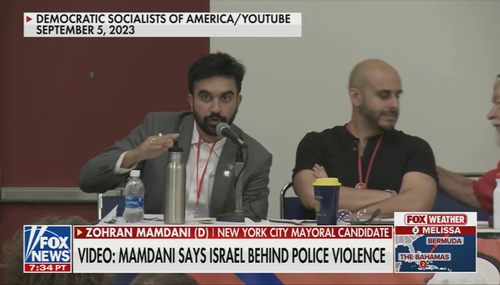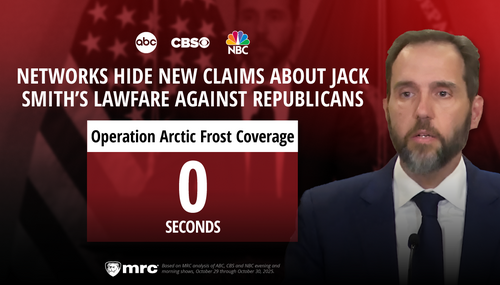While NBC, ABC, and CBS all reported on the Supreme Court's decision Monday to rule on the constitutionality of ObamaCare, none of the coverage made any mention of calls for liberal Justice Elena Kagan to recuse herself from the case due to her advocacy for the legislation as Obama's solicitor general.
Of the three networks, only ABC's World News even noted public opposition to the legislation, as White House correspondent Jake Tapper explained: "The health care law is tremendously unpopular with a new high of 51 percent of Americans viewing it unfavorably and new low of 34 percent approving of it."

Both NBC and CBS held out hope that the high court would uphold ObamaCare. Williams announced: "As for how this ideologically divided court might rule, legal experts say it might not be the usual 5-4 split. Some of the court's conservatives have been willing to uphold broad uses of federal power in the lives of individual citizens." Crawford similarly observed: "Now even though this court leans conservative, that does not necessarily mean it will rule against the administration. In the lower courts, some conservative judges have voted to uphold the law."
CBS's coverage was particularly slanted, as Evening News anchor Scott Pelley opened the broadcast by fretting: "Will the plug be pulled on health care reform?" He later teased: "The Supreme Court will decide whether health reform lives or dies." Crawford declared: "The administration says the law's individual mandate provision is critical to its success. Health reform measures, like insurance for people with pre-existing conditions, won't work unless all Americans pay into the system."
Here is a full transcript of the November 14 NBC Nightly News coverage:
7:00PM ET TEASE:
BRIAN WILLIAMS: In the balance. Can the government force you to buy health insurance? Tonight the Supreme Court has agreed to take on what some say is the biggest case in ten years and it affects all of us.
7:01PM ET SEGMENT:
WILLIAMS: It is a very basic question and it goes right to the heart of the big fight we just went through over health care. Can Americans be forced to buy health insurance? Did Congress have the power to pass such a thing? The Supreme Court announced today they're going to decide this. This is what the Supreme Court does. They decide what's allowable under the Constitution and just taking on this case makes it the biggest in years, with sweeping impact for all Americans potentially. It's where we begin tonight with our justice correspondent Pete Williams. Pete, good evening.
PETE WILLIAMS: Brian, a dramatic day here because the court agreed to wade into the legal battle over this far-reaching law. And it raises a question the court has never confronted before. Does Congress have the power to require virtually everyone to buy something? It's a huge change in federal law and a landmark in the Obama presidency.
BARACK OBAMA: Health care should no longer be a privilege in this country.
WILLIAMS: But it touched off shouting matches at congressional town halls.
CROWD: No government health care!
WILLIAMS: Tea Party protesters took to the streets to condemn it.
CROWD: Kill the bill! Kill the bill!
WILLIAMS: And every Republican candidate for president is against it.
MITT ROMNEY: ObamaCare is wrong. I'll repeal it. I'll get it done.
[APPLAUSE]
WILLIAMS: Opponents, including 26 states, say Congress went too far by requiring nearly all Americans to buy health insurance. The Constitution, they say, allows Congress to regulate the insurance market but not to order citizens to get into it in the first place.
JAY SEKULOW [ATTORNEY]: If we allow Congress to have the authority here, where does it stop? What is the position where the Congress oversteps its bounds if they can, in fact, do this constitutionally?
WILLIAMS: If Congress can do this, some lower court judges have said, it could require everyone to buy broccoli to stay healthy. But supporters of the law say what it really regulates isn't the insurance market. It's the market for health care, something they argue everyone eventually participates in.
DOUG GANSLER [MARYLAND ATTORNEY GENERAL]: Every American citizen is part of the health care system. It may not be today. It may not be next week. It may not be next month. But we're all mortal and we all have to – we all need to see a doctor at some point.
WILLIAMS: What the law governs, supporters say, is how health care is paid for, something they say Congress clearly has the power to regulate. As for how this ideologically divided court might rule, legal experts say it might not be the usual 5-4 split. Some of the court's conservatives have been willing to uphold broad uses of federal power in the lives of individual citizens.
TOM GOLDSTEIN [SUPREME COURT EXPERT]: It would shock me if any of the more liberal members of the Supreme Court voted to strike the statute down. But I would not be at all surprised to see two, maybe even three more conservative votes to uphold it.
WILLIAMS: The court will hear this case in late March. Two days of courtroom arguments spread over five and a half hours, that's a modern record, and then we'd expect the decision sometime in late June, in the middle of the presidential campaign, Brian.
BRIAN WILLIAMS: Pete Williams at the court building in D.C. for us tonight. Pete, thanks.
Here is a full transcript of the ABC World News coverage:
6:37PM ET
JAKE TAPPER: It has been a tumultuous journey for the President's health care law, from the passions of opponents in the August 2009 congressional town hall.
MAN: That they're going to ration health care.-
WOMAN: None of you have done a darn thing!
TAPPER: -to unanimous Republican opposition in Congress-
JOHN BOEHNER: We're going to do everything we can to make sure that Obamacare ever, never, ever is fully implemented.
TAPPER: -and now to the serene but momentous U.S. Supreme Court, which will host a staggering five and a half hours of oral arguments in March and in June the court will either uphold or strike down a key part of the law, just five months before the presidential election. At issue, a provision of the law known as individual mandate which requires every uninsured American to buy health insurance by 2014 or pay a penalty.
BARACK OBAMA: You can't be a free rider on everybody else. You can't not have health insurance and then go to the emergency room and each of us now have to pay the premiums for you.
TAPPER: Lawyers representing 26 states say the federal government has no right to tell people what to buy. The health care law is tremendously unpopular with a new high of 51 percent of Americans viewing it unfavorably and new low of 34 percent approving of it. And Diane as for the political ramifications of this with the decision possibly coming down in the middle of the presidential election campaign season, White House officials say they're confident that the Supreme Court will uphold the constitutionality of the law but they argue with some positive spin if they do strike it down, it could give Democrats a rallying cry for the November elections, giving Democrats something to fight for. That's their optimistic view of a possible defeat. Diane?
Here is a full transcript of the CBS Evening News coverage:
6:30PM ET TEASE:
6:41PM ET TEASE:
PELLEY: The Supreme Court will decide whether health reform lives or dies.
6:44PM ET SEGMENT:
PELLEY: President Obama's health care law is headed to the Supreme Court. The justices agreed today to hear a constitutional challenge. The case is so complex the court has scheduled arguments for more than five hours, longer than ever before. Jan Crawford has the story.
JAN CRAWFORD: It's considered President Obama's signature achievement.
BARACK OBAMA: We are done.
[CHEERS AND APPLAUSE]
CRAWFORD: He had to force the Affordable Care Act through a reluctant Congress. In the end, the law passed without a single Republican vote.
JOHN MCCAIN: You can put lipstick on a pig, Mr. President, but this is still a pig.
CRAWFORD: Now the Supreme Court will decide whether the landmark legislation is unconstitutional or whether Congress went too far when it required that all Americans buy health insurance or pay a penalty. Florida and 25 other states joined forces and sued the federal government to block the law. The 11th Circuit Court of Appeals in Atlanta agreed and struck it down. In a statement today, the White House said, "We know the Affordable Care Act is constitutional and are confident the Supreme Court will agree." Representing the states, Attorney Paul Clement says Congress overstepped its power by making people buy insurance.
PAUL CLEMENT: It is the first time that Congress has ever tried to force somebody to buy a product that they didn't want and that is not a proper regulation of commerce, so it is unconstitutional.
CRAWFORD: But the administration says the law's individual mandate provision is critical to its success. Health reform measures, like insurance for people with pre-existing conditions, won't work unless all Americans pay into the system. Now even though this court leans conservative, that does not necessarily mean it will rule against the administration. In the lower courts, some conservative judges have voted to uphold the law. A decision is expected in June and, of course, Scott, that is right in the middle of the presidential election.
PELLEY: Thanks, Jan.




